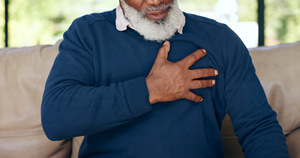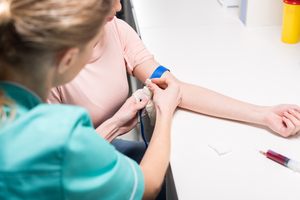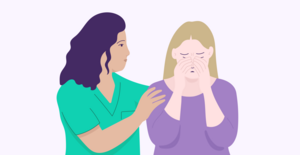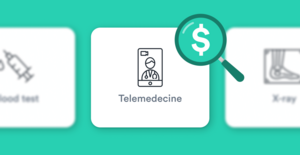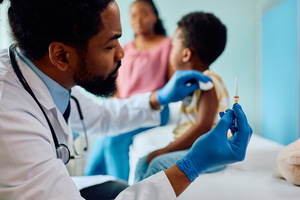Key points
- Oral herpes, caused by the herpes simplex virus type 1 (HSV-1), manifests as painful sores and blisters around the mouth and lips and can recur periodically.
- Symptoms of oral herpes can include painful blisters, itching or tingling sensation, swollen lymph nodes, fever, and sore throat.
- Treatments for oral herpes include antiviral oral medications, antiviral topical ointments, over-the-counter anti-inflammatory medications, and supportive care.
- Medical attention should be sought for the first outbreak, severe symptoms, persistent symptoms, frequent recurrences, signs of secondary infection, or if the patient has a weakened immune system.
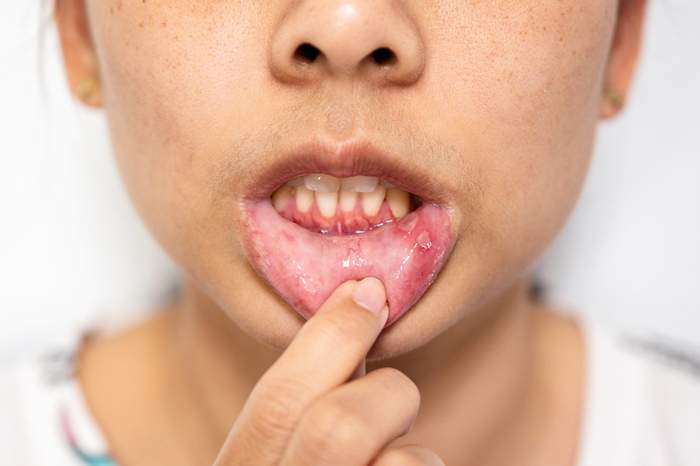
Oral herpes, mainly caused by the herpes simplex virus type 1 (HSV-1), is a common viral infection that appears as painful sores and blisters around the mouth and lips. While many people might only have mild symptoms or even none at all, others may go through recurrent outbreaks that can be quite bothersome. It's really important to understand the symptoms of oral herpes and to know when it’s time to reach out for medical help. This way, you can manage it more effectively and feel more comfortable.
What is oral herpes?
Oral herpes, also known as herpes labialis, is a viral infection primarily caused by the herpes simplex virus type 1 (HSV-1), according to the American Academy of Dermatology Association (AADA). They explain that HSV-1 causes the appearance of painful blisters or sores around the lips, mouth and sometimes the face. The virus is highly contagious and can be transmitted even before symptoms occur through direct contact with an infected person’s skin and saliva or by sharing items such as utensils, lip balm or razors. Avoiding avenues of spread can protect others. Once contracted, the virus remains dormant in the body and can reactivate periodically, leading to recurrent outbreaks.
Oral herpes is commonly called cold sores. The AADA explains that some individuals may not experience noticeable symptoms, especially during the initial infection. For those who do, the symptoms can be severe and include blisters on the entire mouth and throat. Reactivation disease involves itching, burning sensations and the formation of fluid-filled blisters that eventually crust over and heal, usually in the same spot of skin which is innervated by the nerve on which the virus has been dormant. Although oral herpes is usually not a serious health concern, it can cause discomfort and may lead to complications in individuals with weakened immune systems or in certain situations, such as during pregnancy.
Types of oral herpes simplex virus
The herpes simplex virus (HSV) comprises two main types, according to the AADA: HSV-1 and HSV-2, each with distinct characteristics and common infection sites.
-
HSV-1 is primarily associated with oral herpes, leading to cold sores and blisters around the mouth and lips. It is the more common type of herpes simplex virus and is often transmitted through oral contact, such as kissing or sharing utensils. While HSV-1 is predominantly linked to oral infections, it can also cause genital herpes through oral-genital contact.
-
HSV-2, on the other hand, is primarily associated with genital herpes. It is typically transmitted through sexual contact and is less commonly found in oral infections. Individuals infected with HSV-2 may experience recurrent outbreaks of sores in the genital area. While both types of the virus can cause infections in either location, the distinction is important for understanding transmission routes and managing outbreaks. Overall, HSV-1 is more prevalent in the general population, while HSV-2 is more specifically linked to genital infections.
5 symptoms of oral herpes:
Symptoms of oral herpes for the first breakout:
- Painful Blisters or Sores: Fluid-filled blisters appear around the lips, mouth or face, which can be painful and tender.
- Itching or Tingling Sensation: Many individuals experience itching or tingling feeling in the affected area before the blisters appear.
- Swollen Lymph Nodes: The lymph nodes in the neck or jaw may become swollen and tender as the body responds to the infection.
- Fever: Some people may develop a mild fever as part of the body’s immune response to the initial infection.
- Sore Throat: A sore throat can occur, particularly if the virus spreads to the oral cavity.
Symptoms of recurrent breakouts:
- Localized Blisters or Sores: Recurrent outbreaks often present as smaller, less severe blisters that appear in the same area as previous outbreaks.
- Itching or Burning Sensation: Individuals may feel itching or a burning sensation in the affected area before the sores develop.
- Milder Pain: The pain associated with recurrent outbreaks is typically less intense than during the first infection.
- Shorter Duration: Recurrent outbreaks usually heal more quickly, often within a week.
- Triggering Factors: Symptoms may be preceded by identifiable triggers, such as stress, illness or sun exposure.
4 treatments of oral herpes
- Antiviral Oral Medications: Prescription antiviral medications, such as acyclovir, valacyclovir and famciclovir, can help reduce the severity and duration of an outbreak. According to MedlinePlus, these medications are most effective when taken at the first sign of symptoms and may also be used as a preventive measure for individuals with frequent recurrences.
- Antiviral Topical Ointments: Over-the-counter or prescription topical antiviral creams, such as docosanol, can be applied directly to the sores to help speed up healing and reduce pain. According to MedlinePlus, these ointments are often most effective when applied at the onset of symptoms. Use a finger cot to prevent spread.
- Over-the-Counter Anti-Inflammatory Medications: Non-prescription medications like ibuprofen or acetaminophen can alleviate pain and reduce inflammation associated with oral herpes outbreaks. According to MedlinePlus, these medications can provide symptomatic relief and make the discomfort more manageable.
- Supportive Care: Maintaining good oral hygiene, staying hydrated and using soothing remedies such as cold compresses or aloe vera gel can help ease symptoms. It's important to note that the treatment choice will vary depending on the individual's age, overall health and any underlying medical conditions per MedlinePlus. Consulting a healthcare professional is essential to determine the most appropriate treatment plan tailored to each person's needs.
When to seek medical attention for oral herpes
According to the AADA, while many individuals may experience mild symptoms that can be managed at home, certain situations warrant a visit to a healthcare professional. Understanding the signs that indicate the need for medical care can help ensure timely treatment and support, particularly for those with weakened immune systems or experiencing their first outbreak:
- First Outbreak: If you are experiencing your first outbreak of oral herpes, it is important to seek medical attention for proper diagnosis and treatment options.
- Weakened Immune System: If you have a pre-existing condition that compromises your immune system, such as HIV/AIDS, cancer or are undergoing immunosuppressive therapy, you should consult a healthcare professional to manage your symptoms effectively.
- Severe Symptoms: If you experience severe pain, extensive swelling or difficulty swallowing or breathing due to the outbreak, it is crucial to seek immediate medical care.
- Symptoms Persist: If your symptoms do not improve or continue to worsen after taking antiviral medication for more than two days, you should contact your healthcare provider for further evaluation and potential adjustment of your treatment plan.
- Frequent Recurrences: If you find that you are experiencing frequent outbreaks or if the outbreaks become more severe over time, it may be beneficial to discuss long-term management strategies with your doctor.
- Signs of Secondary Infection: If you notice signs of a secondary infection, such as increased redness, pus or fever, it is important to seek medical attention to prevent complications.
Urgent care near me
If you're experiencing symptoms of oral herpes or need urgent care, use Solv to quickly find and book an appointment with a healthcare provider near you.
FAQs
What is oral herpes and what causes it?
Oral herpes, also known as herpes labialis, is a viral infection primarily caused by the herpes simplex virus type 1 (HSV-1). It manifests as painful blisters or sores around the lips, mouth, and sometimes the face. The virus is highly contagious and can be transmitted through direct contact with an infected person’s skin and saliva or by sharing items such as utensils, lip balm, or razors.
What are the symptoms of oral herpes?
Symptoms of oral herpes can include painful blisters or sores, itching or tingling sensation in the affected area, swollen lymph nodes, fever, and sore throat. Recurrent outbreaks often present as smaller, less severe blisters that appear in the same area as previous outbreaks, itching or a burning sensation in the affected area before the sores develop, milder pain, shorter duration, and symptoms may be preceded by identifiable triggers, such as stress, illness, or sun exposure.
How is oral herpes treated?
Treatment options for oral herpes include antiviral oral medications, antiviral topical ointments, over-the-counter anti-inflammatory medications, and supportive care such as maintaining good oral hygiene, staying hydrated, and using soothing remedies. The choice of treatment will depend on the individual's age, overall health, and any underlying medical conditions.
When should I seek medical attention for oral herpes?
You should seek medical attention for oral herpes if you are experiencing your first outbreak, if you have a weakened immune system, if you experience severe symptoms such as severe pain, extensive swelling, or difficulty swallowing or breathing, if your symptoms do not improve or continue to worsen after taking antiviral medication for more than two days, if you are experiencing frequent outbreaks or if the outbreaks become more severe over time, or if you notice signs of a secondary infection.
What are the types of herpes simplex virus?
The herpes simplex virus comprises two main types: HSV-1 and HSV-2. HSV-1 is primarily associated with oral herpes, leading to cold sores and blisters around the mouth and lips. It is often transmitted through oral contact. HSV-2, on the other hand, is primarily associated with genital herpes. It is typically transmitted through sexual contact and is less commonly found in oral infections.

